The pickups that you use in your guitar play a fundamental role in your tone. In fact I would argue that the type of guitar pickups that you use – as well as the design and build of those pickups – contribute more to your tone than many of the other elements of your rig with which you might be concerned.
So if you are looking to improve your tone, and you play a Fender Telecaster or a Telecaster type guitar – then in this article I am going to list some of the best Telecaster pickups for killer blues tones.
The world of guitar pickups is not easy to navigate. In recent years, manufacturers have made huge developments in pickup production, which has increased the range of pickups out there and also made them both more readily available and more affordable. And this has resulted in a wide range of choice. The benefits of this are significant. You now have a lot of different options available, and can tailor your search accordingly to find the best Telecaster pickups for your set-up.
However this choice can also be somewhat overwhelming. There are a variety of ways that manufacturers alter their pickups. And this has resulted in there being many variations of Telecaster pickups that are all very similar to one another. As a result, if you don’t know exactly what you are looking for, it is easy to end up with a set of pickups that are poorly suited for your set-up.
If you are new to the world of guitar pickups, or if you would like to know more about how they function, then I would recommend reading my article: ‘Which Types Of Guitar Pickups Are Right For You?’ In that article I cover pickups more broadly. Specifically, I run through some of the main elements that pickup manufacturers alter to change the sound of their pickups.
This includes the material of the magnets used in the pickups, whether the pickups have been over or underwound, and whether they have been wound by a machine, or by hand. If these concepts are new to you, I would head over there first. This will help you to better understand some of the terms that you are likely to encounter when looking for a new set of Telecaster pickups. And after that, you will better placed to refine your search by looking at specific sets of pickups. It is this latter point on which I will be focusing throughout the rest of this article.
Starting your search
As you might expect, when advertising their pickups, manufacturers don’t typically focus on the more technical elements of pickup design. Instead, they usually organise pickups into groups. These are based on the output of the pickup (how powerful it is) and the type of tone it produces.
This is predominantly to make it easy for the vast majority of guitarists; many of whom don’t want to get into deep technical detail whilst trying to buy new gear. However it is also because the output and tonal characteristics of different pickups are determined by a multitude of complex factors. As such, it is not just as simple as looking at the type of magnet in the pickup, or at whether the pickup is underwound or overwound.
Each of these factors is important. And they will give you a broad indication of the characteristics of the pickup. But it is how these factors combine together which ultimately affects how a pickup sounds.
As such, below I have created categories of different Telecaster pickups, which I hope will help to give focus to your search. These categories are similar to those offered by many of the different pickup manufacturers; though I have added in a bit more detail which I hope will help you to differentiate between the multitude of different Telecaster pickups out there. Below I have added in some of the best Telecaster pickups for:
In the interest of full disclosure, these categories are imperfect. And there are two reasons for this:
Firstly, there is a lot of crossover between different types of pickups and their characteristics. For example, there are Telecaster pickups listed below which will help you to recreate British blues tones. But some of these pickups will also be well suited for heavier, more modern tones. Likewise, there are a whole range of balanced pickup sets out there. And these have the potential to span across multiple categories.
Secondly, when it comes to finding the best Telecaster pickups for the blues, the use of the word ‘vintage’ on the part of pickup manufacturers can be confusing. This is partly because there are so many different types of vintage pickups available. And these sets are often modelled on a specific year or decade. However I would argue that it is also because within a blues context, the term ‘vintage’ is somewhat irrelevant.
This is because most blues guitarists are in search of what you could describe as a ‘vintage’ blues tone. The majority of famous Telecaster players crafted their tones with early Fender Telecasters. And these guitars were fitted with what we would now describe as ‘vintage’ pickups.
As such, if you are looking for killer blues tones, it is highly likely that you are in search of a vintage sound. And so almost all (if not all) of the pickups listed below could be classified as vintage style pickups. Instead then, I have decided to categorise the pickups more specifically, by focusing on the kind of tone they will help you to create.

A note on price
The final point to consider before we look at specific Telecaster pickup sets, is that of price. Normally when recommending guitar gear, I try to do so with a range of different budgets in mind. You will see however that the majority of Telecaster pickups I have recommended below are either boutique or in a higher price range. And I have done this intentionally.
There are a number of reasons for this, which are as follows:
Firstly, changing your pickups is not as easy as buying a new guitar pedal or even a new amp. You need to alter the electronics on your guitar, which most players will have to outsource to a guitar tech. This already adds on an extra layer of cost. It also makes it more troublesome (and potentially expensive) to make changes if you are dissatisfied with your new set of pickups.
If you take a gamble on a cheap guitar pedal or amp, and you find that you don’t like it, you can simply return it, or sell it on. This isn’t true of guitar pickups. You can of course change them and sell them on. But first you have to go through the hassle of replacing them and rewiring the electronics etc. As such, in my opinion it is worth erring on the side of caution and quality when you are looking to upgrade your Telecaster pickups.
Additionally, when you buy a new set of pickups, you are essentially looking to upgrade your current guitar. And again in my opinion this has an impact on the type of pickups you should be considering. Let me explain in a bit more detail by looking at Telecasters across three common price brackets:
If you have an American made Tele or a Tele of similar quality, it will already have high quality pickups. As such, it doesn’t make any sense for you to then go and buy an entry level set of pickups. Instead of upgrading your guitar, you might actually be moving further away from the tone you have in mind.
Likewise, if you have a Mexican made Tele or similar, the pickups that come with the guitar will also be high quality. They won’t be the same as those in an American made Tele. But in this situation, opting for a more expensive set of Tele pickups is a great choice. You can really improve the tone of your guitar and upgrade it to be of a similar (or perhaps better specification) than an American made Tele. And significantly, you can do this at a lower overall cost than buying a factory made American guitar.
The only situation in which I would not recommend opting for high end Telecaster pickups, is if you are playing a Fender Squier or similar. As noted above, it doesn’t really make sense to play a high end guitar with entry level pickups. And the opposite is true here. Firstly, there is something a little odd about the pickups in your guitar costing more than the guitar itself. More importantly though, the potential of those pickups will be somewhat stifled by the quality of the guitar.
As such, if you are in that situation – I would personally recommend either focusing on other areas of your rig (like your amp and pedals), or on spending a little bit more time saving to buy a Mexican or American made Tele, or a guitar of similar quality.
My final argument in favour of looking at higher end Telecaster pickups is two-fold. Firstly it is that generally speaking, the difference in price between entry level and boutique pickups is not that great. In fact it is much less than the disparity in price you are likely to encounter when looking at guitars, amps and pedals. Secondly, even high end boutique pickups are not as pricey as you might expect. In fact, most boutique manufacturers offer pickup sets for around the same price as a single boutique guitar pedal.
So with that final caveat out of the way, let’s get into it. Here are some of the best Telecaster pickups out there for killer blues tones:
Clean blues tones
If you have spent any time looking at Telecaster pickups, you are likely to appreciate how many varieties of ‘vintage’ pickups are out there. Vintage pickups have a number of defining characteristics, one of the most significant of which is that they are not particularly powerful.

The pickups listed in this first category are vintage style Telecaster pickups. Specifically, they are pickups that have a low output. They are the weakest pickups of those included in this article. And this makes them perfect for clean and crisp blues tones. That is not to say you can’t also use them to play with an overdriven tone. But they will not be so well suited if you are looking for heavy blues tones or if you want to push your amp into breakup at low volumes.
Instead, this type of Telecaster pickup will work well if you typically favour a clean tone. If you want the clear, crisp and ‘twangy’ tones of early blues and country guitarists and you are less interested in heavy blues tones, then one of the following sets could make a great addition to your rig:
- The Creamery – Vintage 1 ‘Nocaster’ Alnico 3 Pickups
- Seymour Duncan Alnico II Pro Tele Pickups
- Fender Custom Shop ’51 Nocaster Pickups
- Lollar Pickups – ’52 T Series Pickups
- Fralin Pickups – Stock Tele Pickups
As you can see – the majority of these Telecaster pickups are modelled on pickups from the 1950s. The Telecaster was first offered for sale in 1951, and so these pickups aim to recreate the distinctive tones of those very early Teles. It is for this reason that many of the pickup sets listed above make use of the ‘Nocaster’ name.
In the early 1950s, Fender made a guitar called the Fender Broadcaster, which was an early version of the Fender Telecaster. At the same time, Gretsch released a drum kit called the ‘Broadkaster’. They threatened Fender with legal action, and in response, Fender were forced to produce the Broadcaster without a name for a period of time. As a result, the guitars that they manufactured during this early period became known as ‘Nocasters’.
So if you are looking for a classic Tele sound that will give you clear, crisp and twangy tones, one of these pickup sets could make a great choice. Combined with the right amp and overdrive pedal(s) you will also be able to dial in some singing and more overdriven lead tones too.
Low gain blues tones
These Telecaster pickups – like those listed above – are also ‘vintage’ style pickups. As above, many of these Telecaster pickups are modelled on guitars from specific years. Here though, the majority are based more closely on pickups from early Fender Broadcasters.
Although the Fender Broadcaster was very similar to what we now call the Fender Telecaster, it had more powerful pickups. This was particularly the case for the bridge pickup in these guitars, which often had quite a high output. This gave the Broadcaster a rounder and fuller tone when compared to most of the Telecasters that were produced during the 1950s.
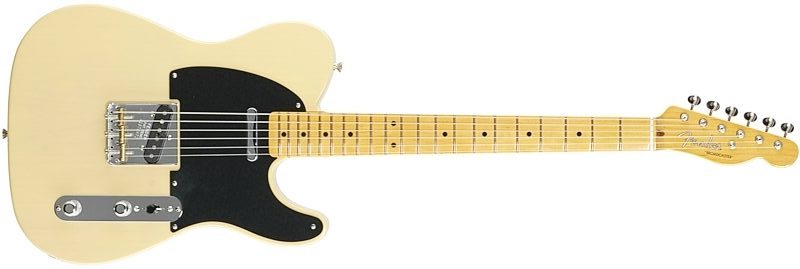
As such, if you want to create a vintage Tele tone that is a little smoother and with a little less ‘twang’, then opting for a set of Telecaster pickups modelled on early Broadcaster guitars could be a great choice.
Not only will they give you a warmer and thicker tone, but the higher output from these pickups will help you to push your amp into a vintage bluesy overdrive. Some of the pickup sets I would recommend are as follows:
- Seymour Duncan – Vintage Broadcaster
- The Creamery – Vintage 2 ‘Broadcaster’
- Bare Knuckle Pickups – Blackguard Tele Series Flat ’50
- Suhr Classic T Pickups
- Lollar Pickups – Tele Vintage Pickups
- Fralin Pickups – Blues Special Tele
These Telecaster pickups are still weak compared to many of the different Telecaster pickups out there (and also listed below). However they have a little more bite and a different tone compared with those listed above. This makes them a great choice if you want a vintage Tele tone, but you want a slightly warmer and less treble intensive sound.
Texas blues tones
The ‘Lonestar State’ has produced some of the most notable blues guitarists of all time. Stevie Ray Vaughan, Billy Gibbons, Jimmie Vaughan, and Gary Clark Jr. are just some of the brilliant guitar players to have been born in Texas. Yet when it comes to stinging Telecaster driven Texas blues tones, for most guitarists there is just one player that springs to mind – Albert Collins.

The ‘Master of the Telecaster’ has one of the most iconic Telecaster tones of all time. It is fiery, sharp and biting – and yet it never sounds thin or strident.
Roy Buchanan crafted similar tones. And although Buchanan was from Arkansas and not Texas – nowhere is his tone captured better than on the album ‘Live From Austin, TX’.
As such, the Telecaster pickup sets I have added in below are included to help you create the searing tones of both of these players.
Collins used a humbucker pickup in the neck position on his guitar. Yet here I will be focusing on single coil pickups. This is partly because Collins used his bridge pickup with much greater frequency when playing lead. However it is also because below I have added in a separate section covering humbucker pickup options.
Now though, let’s look at some of the Texas style Telecaster pickup sets that will help you recreate the searing tone of the ‘Iceman’. Some of my top recommendations here are as follows:
- Fender Custom Shop Texas Special Tele Pickups
- House Of Tone – Texas Tea Pickups
- Stephens Design Pickups – ‘Ice-House’ Standard Lead Pickups
- Righteous Sound Pickups – Revelator
Compared to the Telecaster pickup sets listed up to this point, these Texas style pickups have a slightly increased output. This gives them a bigger and beefier tone, whilst retaining the characteristic bite you want from a Telecaster.
British blues tones
When you think of iconic British blues tones, it is likely that a Gibson Les Paul – rather than a Fender Telecaster – springs to mind. After all, many of the most notable British players favoured the Les Paul to craft their killer blues tones. Peter Green, Jimmy Page, Paul Kossoff and Eric Clapton (in his earlier career) are just some of the famous bluesmen to favour the Les Paul. And so it is perhaps little surprise that the Les Paul remains the guitar of choice for most when it comes to crafting classic British blues tones.

Yet that does not mean that you need to rush out and buy a Les Paul just yet. Jimmy Page played a Telecaster during the early years of Led Zeppelin. And in fact he used a Telecaster to record his iconic guitar solo on the song ‘Stairway To Heaven‘.
The specific Telecaster he played was given to him by Jeff Beck, who had used the guitar extensively with The Yardbirds. And prior to Beck playing with The Yardbirds, Eric Clapton played a Telecaster during his time with the band. He later did the same for a brief time with Blind Faith.
Although he used the Telecaster in quite a different way, Rory Gallagher played a Telecaster to dial in his searing slide guitar tones on songs like, ‘Who’s That Coming?’, ‘Bullfrog Blues‘ and ‘I Could’ve Had Religion‘. Lastly and significantly, the Telecaster has been Keith Richards’ main guitar of choice for his entire career.
The tones of these players have quite a lot of similarities to those of Albert Collins and Roy Buchanan. In my opinion the key differences are that they are not quite so bright and sharp. They are also a bit more aggressive and overdriven. So if you are looking for a slightly heavier blues tone, here are some of my top pickup recommendations:
- Bare Knuckle Pickups ‘Yardbird’ Pickups
- Radioshop Pickups – Vintage ’64 Pickups
- Monty’s Guitars – Full Monty Tele Pickups
- Fender Pure Vintage ’64 Pickups
- Bare Knuckle Pickups ‘Brown Sugar’ Pickups
The Bare Knuckle pickup sets here are modelled specifically on the tones of British Telecaster players. So if you are looking for classic British blues rock tones, one of these sets would make a brilliant choice. The other sets are not focused on recreating the tones of a particular player. However I have included them here because they have a higher output. As such, within the context of the right rig they will help you to dial in a range of beautiful British blues tones.

Heavy blues tones
Compared with the Fender Stratocaster, the Fender Telecaster is a more powerful guitar. It is for this reason that the Telecaster is often used by rock and indie guitarists who are looking for heavily overdriven tones.
Now even if you have no desire to dial in indie style rock tones, you can use a Telecaster to create a range of heavy blues tones. And you can do this whilst maintaining the characteristic Tele bite and twang.
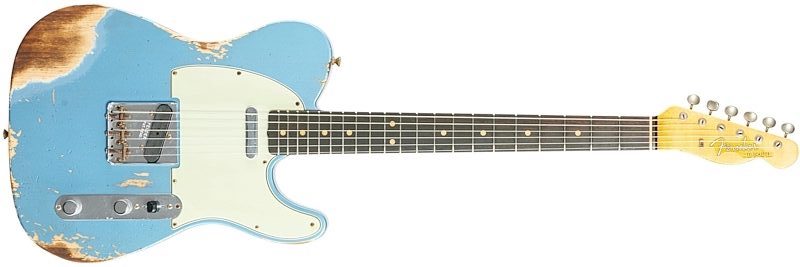
Many of the players noted above used a Telecaster to create fiery blues tones. Albert Collins, Rory Gallagher, Jimmy Page and Roy Buchanan all pushed their Telecasters into heavy overdrive. And in more recent years, modern blues guitarist Josh Smith has done the same.
If you want to create similarly heavy tones, and you are looking for pickups with a bit more power and aggression that will also help you push into ‘modern’ tone territory, then I would recommend one of the following sets of pickups:
- Seymour Duncan – ‘Hot Tele’ Pickups
- Fralin Pickups – High Output Tele Pickups
- Bare Knuckle Pickups – ‘Piledriver’ Pickups
- The Creamery – Hot Tele Pickups
- Seymour Duncan – ‘Quarter Pound’ Tele Pickups
Any of the above pickup sets will help you to dial in a range of killer heavy blues and blues rock tones. So if you spend most of your time at the higher gain side of the tonal spectrum, one of these options could make a great choice.
Humbucker tones
The Fender Telecaster is a naturally versatile guitar. And it is for this reason that it has been played by guitarists across a range of different genres.
Yet it can arguably be made even more versatile by replacing the neck pickup with a humbucker. Albert Collins played a Telecaster with this set-up. And inspired by Collins, Joanne Shaw-Taylor has gone on to play Collins’ signature guitar with the same set-up.

Replacing the single coil neck pickup in your Telecaster with a humbucker is a slightly more radical change. As such, it is one that I would recommend considering fully before you alter your existing pickup configuration.
Having said that – depending on the type of tones you have in mind – using a humbucker on your Tele could work very well. And there are two reasons for this:
Rhythm vs. lead tones
In comparison with single coil pickups, humbucking pickups have a darker and warmer sound. The bridge pickup on Telecasters is typically very bright and sharp sounding. It works very well for lead, but for rhythm you might want a warmer and more rounded tone.
So by using a humbucker in the neck position, you have the ability to switch between a warmer and softer rhythm sound, and then a sharper lead sound that really cuts through the mix.
This was how Albert Collins often used his humbucker pickup. Just watch this clip of him opening at the Montreaux Jazz Festival in 1979. He begins with a warm and rounded rhythm tone. Then shortly after the 2 minute mark, his tone totally changes. It becomes sharp and biting after he switches to the bridge pickup.
Joanne Shaw-Taylor uses the humbucker pickup on her Telecaster in much the same way.
Heavy blues rock tones
Humbucker pickups are also more powerful than single coils. And whilst some of the higher output single coil pickups listed above will help you to dial in heavy blues tones, adding a humbucker into the mix will push things onto the next level. Not only this, but it will allow you to create a darker tone. This then gives you the option to create sharp, treble intensive blues rock tones, as well as darker and more rounded overdrive tones.
There are a whole range of different humbucker pickups out there that could work in your Telecaster. Just some of my recommendations are as follows:
- Fralin Pickups – Wide Range Humbucker
- Lollar Pickups – Regal Humbucker
- Creamery Pickups – Single Coil / Humbucker Neck Set
- Seymour Duncan – ’59 SH1 Humbucker
- Bare Knuckle Pickups – Stormy Monday Humbuckers
Replacing your neck pickup with a humbucker gives you a lot of different options from which to choose. For example, you could use a vintage style humbucker pickup in the neck for warm rhythm tones. And you could combine that with a high output single coil for twangy Tele tones. Or you could do the opposite. You could use a powerful humbucker in the neck alongside a weaker pickup in the bridge for an all around warmer tone. The options and combinations are endless.
Narrowing your search
At this stage, you might understandably be feeling somewhat overwhelmed. After all, there are still a lot of options from which to choose, even in this curated list.
If that is the case, then I would recommend going through a process of elimination to help focus your search. All of the Telecaster pickups listed in this article have the potential to sound brilliant. And so you have to be very discerning about exactly what you want from a new set of pickups.
The key here is to take time to fully consider not only the type of tone that you want to create, but also how your pickups fit more broadly within the context of your rig. This will help you to avoid the two key mistakes that many guitarists make when looking at new pickups. These are as follows:
Firstly, when buying new pickups, many guitarists don’t fully consider the range of tones they might want to create. Instead they end up focusing on achieving a very specific sound. And they do so without considering the broader range of tones they might also want to produce.
In this way, they can end up feeling limited by their choice of pickups. They may feel ‘stuck’ having to play with a particular kind of tone, when in actual fact they are looking for a broader range of blues tones.
So before you go for any of the pickup sets listed above, take time to fully consider the kind of tones you want to create. And the good news here, is that if you do want to create a very specific tone, you do not need to rely solely on your pickups.
This brings me to my second point:
When choosing new pickups, a lot of guitarists fail to take a holistic view of their set-up. They often forget about or underestimate the impact that their amp, pedals and guitar have on their tone. And this either leads them to place too much emphasis on their new pickups, or to overlook potential gains to their tone they can achieve without changing their pickups.
The pickups that you use have a profound impact on your tone. Yet so does your amp, your pedals, your guitar, the speakers in your amp, and so on. The tone that you produce is a result of all of these different factors. And it is important to recognise this point for two reasons:
The first is to avoid disappointment. If you fit your Telecaster with a set of ‘Brown Sugar’ Keith Richard’s style pickups, and yet the rest of your rig is totally different to Richards’, the likelihood that you will recreate his specific tone is relatively slim.
I don’t say this to put you off. In fact quite the opposite! I want you to make the right buying decisions and to avoid frustration and disappointment. And one of the best ways to achieve this, is to constantly think about your personal playing context, and where a set of new pickups fits within that context.
The second, is to capitalise on quick wins. You don’t need to opt for a particular type of pickup to create a specific tone. You can also use your amp and pedals.
Let’s take a player like Albert Collins for example. Collins has a sharp and biting blues tone. So if you want to recreate his tone, all of the time, then opting for a treble intensive set of Texas style Telecaster pickups would work very well.
However if you only want to create his tone on occasion, opting for those kind of pickups might not be such a good idea. And this is where your amp and pedals can make a big difference. You can crank the treble on your amp, and use a treble booster pedal. Doing so will help you to create a similar fiery tone, without having to make such dramatic changes to your guitar.
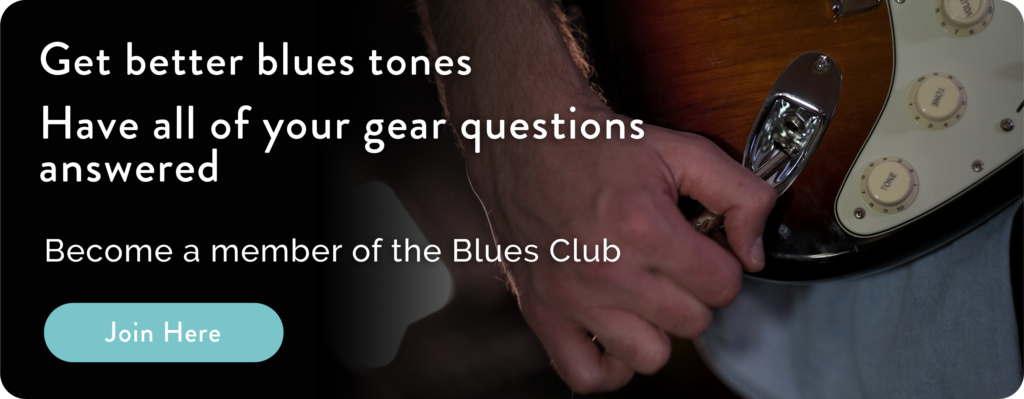
Closing thoughts
Understanding these ideas is empowering. It immediately gives you focus. And this makes it easier and more enjoyable to decide what will work for you.
Of course, deciding on the final set of pickups won’t be an easy process. And as a closing point, it is worth noting that the suggestions listed throughout are by no means exhaustive. There are a huge variety of Telecaster pickups out there. And many of these will help you to create killer blues tones. To compile them all in a single article would be impractical, and most likely impossible. After all, pickup manufacturers continue to improve upon their existing designs, as well as release new pickup sets.
As such, I would recommend treating the information outlined here as a guide. Use it to help focus your search. Look for the characteristics that are important to you. Use this, in combination with some of the recommended brands and manufacturers, and it will ensure you choose the right Telecaster pickups for your set-up.
Good luck! And if there is anything at all I can help with, or if you have any questions, just pop them in the comments below or send me an email on aidan@happybluesman.com. I am always around and happy to help! 😁
References & Images
Unsplash, Sweetwater, Guitar Guitar, Bare Knuckle Pickups Forum, Wikipedia, Fender, TDPRI, Fender Custom Shop, Wikipedia, Guitar, Ground Guitar, YouTube, Fralin Pickups
Links
Many of the links embedded in this article are affiliate links. As such, if you buy one of the pieces of gear I recommend, or an item from the same store after clicking one of these links, I will earn a small commission. I never recommend pieces of gear that I wouldn’t use myself, and I include these affiliate links to ensure that I can keep this content free. If you have any questions, please feel free to reach out to me on aidan@happybluesman.com.

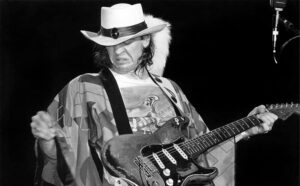
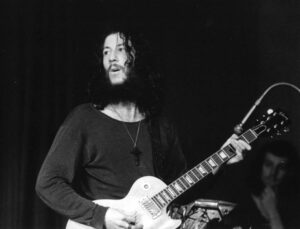
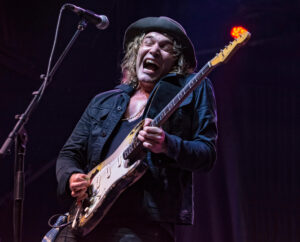
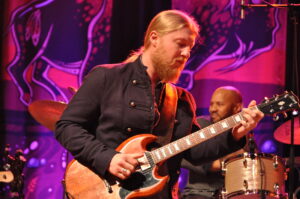
Responses
How about Fenders Twisted Tele pickups? Where would they fit in?
Thanks very much for the comment Ekan! From everything I have seen and heard, the Twisted Tele pickups are great and could be a brilliant choice for you, depending on the type of sound you have in mind. I didn’t include them here just because they have a higher output, and I personally favour a slightly lower output when it comes to dialing in those ‘classic’ blues tones.
But if you are looking for classic blues tones, as well as slightly heavier rock tones, then the Twisted Tele pickups could make a great choice! 😁
Nice comprehensive look, Aidan! I only wish you had mentioned mini humbuckers as a neck option. That’s what I’ve got in mine (SD vintage mini), and Fender actually sold a butterscotch blackguard about fifteen years ago with that configuration.
Thanks very much for the kind words and suggestion Jonas – I really appreciate it! That is a great point about the mini humbuckers, and I absolutely agree that a mini humbucker in the neck position on a Tele would be a great choice.
I’ll shortly be writing a dedicated article about humbucker pickups, and I’ll make sure to add some mini humbucker options in there, which would also work well for Telecasters 😁 Thanks again!
Obviously you’ve never played any David Allen pickups…better than most everything on the lists. Klein makes great pickups too. I’ve never liked anything from Seymour Duncan except their antiquities line.
Thanks very much for the suggestion Steve – I haven’t played any as it happens but will make sure to get onto the case soon! 😁
[…] Guitar Geeks Only: Here’s a deep dive article on the best pickups to use in a Telecaster. (Hey, I told you it was geeky.) […]
Don Mare pickups are the place to get all of these tones. That guy is a Telegenius when it comes to Tele tones. The stock pickups in the Classic Vibe Tele’s were Toneriders. They sound great, no need to change them, and those guitars have a wonderful feel and tone. Allen, McNelly, and Porter also make outstanding pickups.
Thanks very much for the comment and for sharing Sarge – I hadn’t come across Don Mare and I really appreciate you putting him on my radar! 😁
I love the Seymour Duncan Antiquity Tele Lead. To my ear, it is a sweeter version of the alnico 2 pro. That with an Antiquity humbucker in the neck made me fall in love with my amp all over again, and sell off most of my pedals.
Thanks so much for taking the time to comment and share your experience Joseph, I really appreciate it. I’m also very glad to hear you’re getting on so well with the antiquity Tele lead. It sounds like you have a killer combination there! 😁
I’d like to throw in Rio Grande Muy Grande pickups. I have a set in my Hwy1 and it sounds killer.
Thanks very much for the suggestion and for taking the time to comment Stuart, I really appreciate it. Rio Grande pickups are brilliant and I’m very glad to hear you’re getting on so well with them. It sounds like you have a killer set-up there! 😁